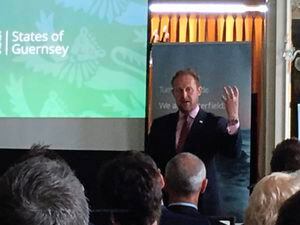Spending likely to rise next year – States CEO
PUBLIC spending is likely to increase next year, despite efforts to slim down and make the States more efficient, its chief executive has warned.

Brexit, climate change, transport links, and dealing with backlogs in orthopaedic surgeries were among the reasons given for the anticipated rise in government spending.
Implementing the recommendations of the independent review into nurses’ pay was cited as another cause for spending to go up.
Last year it was announced that 200 civil service jobs were to be shed, but yesterday an on-island recruitment campaign was launched to attract high-calibre workers, with a strong community ethic, to the civil service.
States chief executive Paul Whitfield was giving an update on public service reform to a meeting of the Institute of Directors.
He said the list of demands on government was always growing.
‘The States and the community have performed admirably in getting us to a place where we’ve had a surplus in terms of public spending since the introduction of zero ten, but already that surplus could quickly turn to deficit such is the scale of the challenges we face, particularly the fiscal demands coming towards us in 2020,’ he said.
The 10-year public sector reform programme was launched in 2015, when it was decided that the States was operating in a way that was inefficient, without integrated human resources, procurement or IT functions, and with a workforce that felt out-of-touch and unappreciated.
Mr Whitfield said the States had changed since 2015.
Changes included the complete organisational redesign, work on the gov.gg website, which is used by 60,000 people each month, priority-based budgeting, a new mobile app for rent rebate and income support clients, better use and understanding of data, the release of public buildings such as Grange Road House, more investment in health, and the monumental overhaul of Guernsey’s schools.
Mr Whitfield also spoke about a change of culture in the workforce, which meant staff were working together better, cutting bureaucratic red tape, embracing technology improvements, being more flexible and improving the experience for customers.
‘It’s not just moving chairs around the office,’ he said.
This week the States agreed to spend around £200m. on a 10-year IT transformation programme led by Agilisys, and that decision put Mr Whitfield in an upbeat mood.
‘If it all seems like doom and gloom, I’ve actually got something to smile about this week.’
‘This is a significant step forward and a result of more than two and a half years of work.’
‘It will result in the better use of technology to make our services more efficient, it also gives us the tools to transform, so whilst it can’t provide all the solutions on its own, it’s clear that digitisation and automating and bringing online certain services is going to help us better meet the expectations of our community.’
Mr Whitfield’s speech was well received by his audience of IoD members.
IoD Guernsey branch chairman John Clacy was encouraged by the update: ‘This is probably the most complex and significant transformation process seen on the island and so it was positive to hear the deputies giving a strong endorsement of the project in their overwhelming vote to approve the future digital services.’
‘The IoD remains strongly supportive of Paul, his team and the transformation.’





